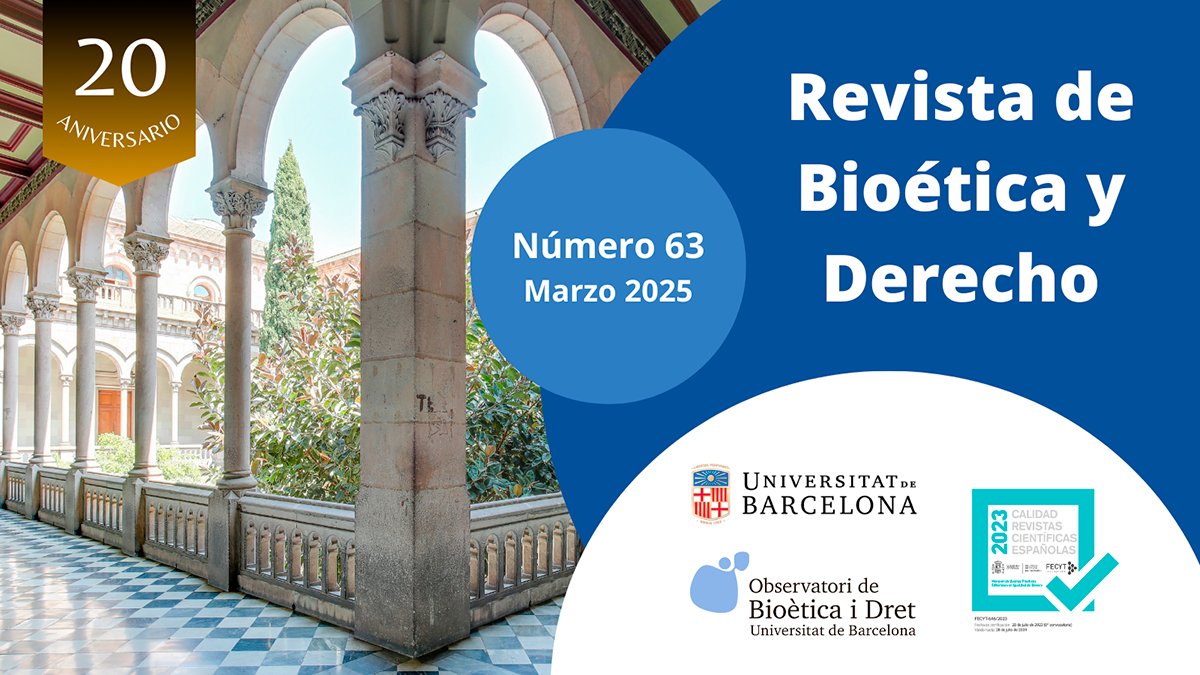La situación jurisprudencial de las técnicas de reproducción humana asistida en los tribunales peruanos
DOI:
https://doi.org/10.1344/rbd2025.63.45460Keywords:
Assisted Human Reproduction, Surrogacy, Egg Donation, Parentage, Assisted ProcreationAbstract
In recent decades, Peru has witnessed a remarkable rise in the use of assisted human reproduction technology (ART) which can be attributed to various pathological and social factors. The prevalence of infertility, recognized by the World Health Organization (WHO) as a disease, has led individuals to increasingly turn to these innovative methods. ART has notably gained traction at the national level. However, due to the absence of pertinent explicit regulations in Peru, legal issues have arisen concerning the recognition of the filial bond between those born through these techniques and their parents who had "procreational will” to conceive them, but not the biological ability. These problems have led to various legal rulings, primarily addressing questions of determining maternity or paternity. This article aims to present and analyze different cases discussed in the Supreme Court and Constitutional Court of Peru related to ART, with a focus on "egg donation" and "surrogacy," which have contributed to the development of an interesting jurisprudence grounded in general principles of law.
References
REFERENCIAS BIBLIOGRÁFICAS
- Cieza, J. (2017). Las técnicas de reproducción humana asistida. El impacto y la necesidad de una regulación jurídica en el Perú. Lima: Instituto Pacífico.
- Congreso de la República del Perú. (2006). Ley Nº 14/2006 del 26 de mayo de 2006 por la cual se emite la Ley General de Salud. Lima: Congreso de la República del Perú.
- Grupo PRANOR. (2023). Tratado de Reproducción Humana Asistida. Mad Corp. SA. Lima.
- Instituto Nacional de Estadística e Informática. (mayo 2022). Encuesta Demográfica y de Salud Familiar. ENDES 2021. Nacional y Departamental. Disponible en: https://www.inei.gob.pe/media/MenuRecursivo/publicaciones_digitales/Est/Lib1838/ (Consultado el 21 de mayo de 2021)
- Rubio, M. (1996). Reproducción Humana Asistida y Derecho. Las Reglas del Amor en Probetas de Laboratorio. Lima: Fondo editorial de la PUCP.
- Valdivia, T. (2020). La necesidad de regulación de la Gestación Subrogada en el Perú: un enfoque jurídico, social y bioético para una propuesta normativa integral (tesis de pregrado). Universidad de San Martín de Porres, Perú.
- Varsi Rospigliosi, E. y Mardini Burgos, J. (2021) Los contratos de maternidad subrogada desde una perspectiva del Análisis Económico del Derecho. En: Rev Bio y Der. 2021; 53: 159-180. P.175. DOI 10.1344/rbd2021.53.3261
SENTENCIAS
- Corte Interamericana de Derechos Humanos. (2012). Sentencia de 2012 sobre el caso Artavia Murillo y otros ("Fecundación in vitro") vs. Costa Rica. Excepciones Preliminares, Fondo, Reparaciones y Costas. Costa Rica: Corte Interamericana de Derechos Humanos. Recuperado de: http://www.corteidh.or.cr/cf/Jurisprudencia2/ficha_tecnica.cfm?nId_Ficha=235
- Pleno del Tribunal Constitucional Peruano. (16 de octubre de 2009). Sentencia sobre el Expediente 02005-2009-PA/TC-Lima (ONG “Acción de lucha anticorrupción”). Lima: Tribunal Constitucional.
- Quinto Juzgado Especializado en lo Constitucional. (21 de febrero de 2017). Sentencia del Expediente 06374-2016-0-1801-JR-CI-05. Lima: Corte Superior de Justicia de Lima.
- Sala Civil Permanente de la Corte Suprema del Perú. (06 de diciembre de 2011). Recurso de Casación 563-2011-Lima. Lima: Corte Suprema de Justicia del Perú.
- Sala Civil Permanente de la Corte Suprema del Perú. (06 de mayo de 2008). Recurso de Casación 5003-2007-Lima. Lima: Corte Suprema de Justicia del Perú.
- Sala Civil Permanente de la Corte Suprema del Perú. (11 de agosto de 2011). Recurso de Casación 4323-2010-Lima. Lima: Corte Suprema de Justicia del Perú.
- Sala Civil Transitoria de la Corte Suprema del Perú. (14 de marzo de 2018). Recurso de Casación 1520-2017-Lima. Lima. Corte Suprema de Justicia del Perú.
- Segunda Sala Constitucional Permanente. (14 de agosto de 2018). Sentencia de Segunda Instancia sobre el Expediente 01286-2017-0-1801-JR-CI-11 (recurso de amparo). Lima: Corte Superior de Justicia de Lima.
Downloads
Published
How to Cite
Issue
Section
License
Copyright (c) 2024 Enrique Antonio Varsi-Rospigliosi, Twany Fiorella VALDIVIA FIERRO

This work is licensed under a Creative Commons Attribution-NonCommercial-NoDerivatives 4.0 International License.
 The author retains the copyright and grants Revista de Bioética y Derecho the right of first publication of the article. All articles published in Revista de Bioética y Derecho are under Creative Commons licensing Recognition – Non Commercial – NoDerivedArtwork (by-nc-nd 4.0), which allows sharing the content with third parties, provided that they acknowledge its authorship, initial publication in this journal and the terms of the license. No commercial use of the original work or generation of derivative works is permitted.
The author retains the copyright and grants Revista de Bioética y Derecho the right of first publication of the article. All articles published in Revista de Bioética y Derecho are under Creative Commons licensing Recognition – Non Commercial – NoDerivedArtwork (by-nc-nd 4.0), which allows sharing the content with third parties, provided that they acknowledge its authorship, initial publication in this journal and the terms of the license. No commercial use of the original work or generation of derivative works is permitted.







